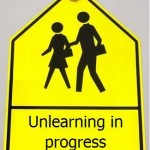 A social business is nothing if not a hive of learning and adaptation. Whether on an individual or an organizational level, it’s crucial that there is a constant state of progress. The requirement for such a state is predicated on the rapid pace of change in our external environment. Adaptation is therefore the only means of either maintaining or increasing our effectiveness within this environment.
A social business is nothing if not a hive of learning and adaptation. Whether on an individual or an organizational level, it’s crucial that there is a constant state of progress. The requirement for such a state is predicated on the rapid pace of change in our external environment. Adaptation is therefore the only means of either maintaining or increasing our effectiveness within this environment.
It’s seldom the case that we learn from doing the right thing. Indeed, were this the case, the plethora of organizations succumbing to the innovators dilemma would not be quite as long as it is. Instead, most of our learning tends to come from the mistakes we make. That much is pretty clear, and failing has seldom been as popular as it is today.
It’s folly however to believe that merely making mistakes is enough in itself. For learning to occur, you have to have a number of things in place.
For instance, first of all you have to understand that you’ve made a mistake, therefore you need means of collecting information to inform you of the mistakes you’ve made. You then need to understand and identify the source of your mistake, which requires a level of understanding and insight. Knowledge is then required to correct your mistakes and learn from them.
Of course, I’m sure we can all appreciate that this doesn’t happen all that often. It helps therefore to understand a bit more about the whole adaptation process.
Mistakes, for instance, tend to come in two forms. Errors of commission involve doing something that should not have been done, whilst errors of omission involve not doing something that should have been done. It’s much more common to communicate errors of commission than it is those of omission, which is a big mistake, as it is usually the things you didn’t do that result in your capabilities dropping.
There is also often a lack of time and effort put into getting better at learning itself. The pace of change in our working environment is only ever going to get quicker, so the skills we have today are going to become obsolete at an ever quickening pace. Knowing how to learn therefore is a crucial skill to have if we’re to actually become a learning organization.
Arguably the biggest obstacle however is in unlearning what has gone before. It’s often the case that what you’re doing is really a mistake. It still does ok, but there are better ways of doing it out there. The first step therefore is often to unlearn what has gone before and to reassess your beliefs.
As the pace of change accelerates, the process of learning, and unlearning, are therefore crucial, at both the individual and the organizational level, if you’re going to succeed.
I’ve written previously about the importance of having a passion for your work in order to have sufficient desire to put effort into this whole process. To ensure you learn, and unlearn, to sufficient levels will require you to devote significant time and effort to the task.
This kind of energy underpins the learning agility that you will need to succeed. It will empower you to dispatch the old rules of the game and adopt the new ones.
Energy alone however is not enough. You may be able to acquire knowledge through effort alone, but you will also need sound judgement to no which knowledge to let go.
History is littered with people and institutions that didn’t manage to do that. Whether it’s companies that have gone bust, or professions that have ceased to exist, creative destruction has proved a dismissive mistress. Just as organizations attempt to map the trends out before them, so too do you need to as individuals.
Change is just about the only constant we can rely upon, it is up to you how you respond to it.